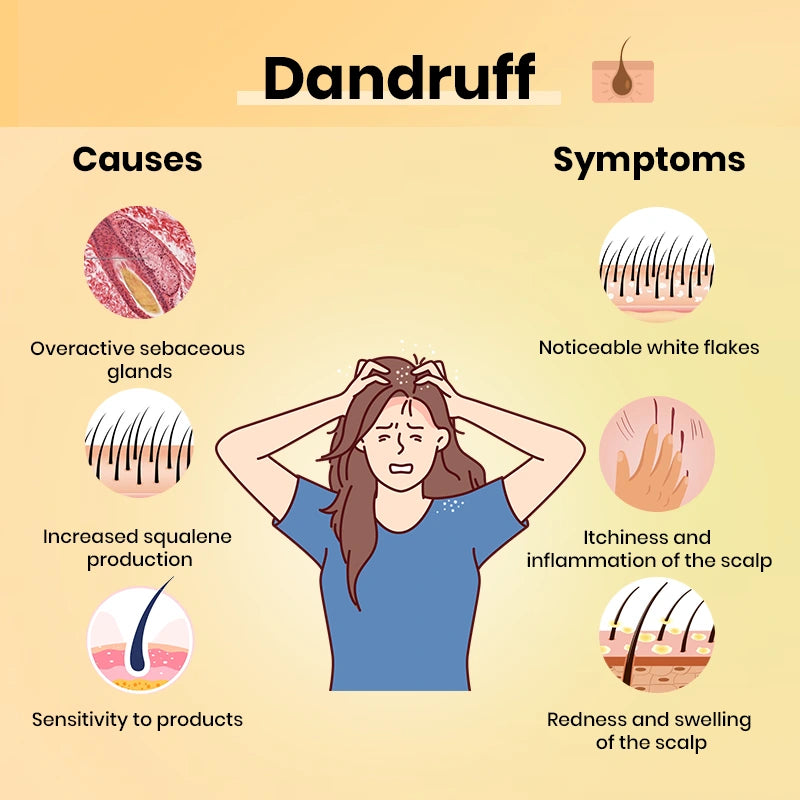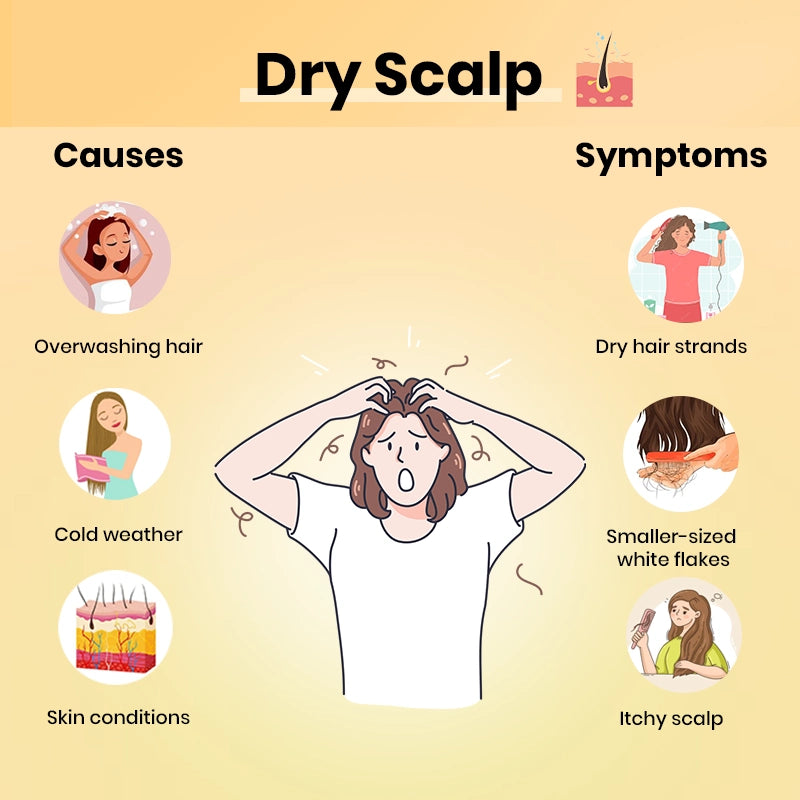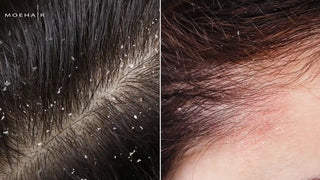 Table of contents
Table of contents
Flakes on the shoulder and itchy scalp—dandruff or dry scalp? It’s rather confusing to figure out. While the symptoms of dandruff and dry scalp on the surface look similar, they are different issues. Using both issues interchangeably is a blunder, each demanding a different treatment plan.
If you use anti-dandruff shampoo but the flakes continue to exist stubbornly, perhaps you are mistaking a dry scalp with dandruff. Knowing the difference between dry scalp and dandruff is crucial to getting to the root cause. Let’s discuss each in detail and how it can be identified and treated.
Also Read - How to use anti dandruff shampoo
Dandruff vs Dry Scalp – What's the difference?
Dandruff is a scalp condition that triggers pieces of dry scalp skin to slough off, resulting in the formation of flakes. According to research, an imbalance in the scalp microbiome with over-colonization of the yeast genus Malassezia causes dandruff. Yeast overgrowth and excess sebum secretion cause skin cell build, eventually leading to its shedding in the form of flakes.
A dry scalp, however, is not a medical condition and can be reversed by a change in the haircare routine. It occurs from scalp dryness, often triggered by excess washing and harsh products. When the scalp epidermis (top skin layer) lacks moisture and cannot produce adequate sebum, it causes dryness, resulting in the formation of flakes. Dry weather conditions might further aggravate the issue.
As Dr. Mona Gohara, MD, Associate Clinical Professor of Dermatology at Yale School of Medicine, told Good Housekeeping, "Dandruff is coming from inside the body, and with dry scalp, there's something on the outside that's causing it to happen." Now that we know what dandruff vs. dry scalp is, let's explore some of the symptoms and probable treatments.
Dandruff vs Dry Scalp – Causes and Symptoms
Dandruff - Causes and symptoms

Dandruff is primarily caused by scalp microbiome imbalance. A dirty scalp sometimes triggers it, while sometimes, it is genetically linked. Here are some of the causes of dandruff:
- Overactive sebaceous glands — Dandruff might be triggered by overactive sebaceous glands, which lead to excess sebum production. As the scalp fungus feeds on oil, it creates a favorable environment for fungi, leading to the overgrowth of Malassezia species. As a result, it forms microscopic dead cells that stick together and fall off as flakes.
- Increased squalene production – If you have oily or greasy hair, this might be another reason for dandruff. According to research, scalp sebum contains squalene, which might cause inflammation, triggering dandruff.
- Sensitivity to products – If your scalp is sensitive to specific products, it might cause dandruff. Certain products might irritate the scalp and trigger infections like dermatitis, psoriasis, and eczema, eventually resulting in dandruff.
Symptoms of dandruff
- Noticeable white flakes
- Itchiness and inflammation of the scalp
- Redness and swollen of the scalp
Dry hair - Cause and symptoms

Dry hair causes
The predominant cause of dry hair is lack of moisture or inability to produce enough sebum. Here are some of the common causes of dry scalp:
- Overwashing hair — Using harsh products and overwashing hair strips off natural oil, eventually leading to a dry scalp.
- Cold weather - When the weather is cold, There is less moisture in the air, which results in drying the scalp skin.
- Skin conditions — Chronic conditions like psoriasis, scalp ringworm, solar keratosis, etc., cause rough, dry scalp patches.
Dry scalp causes itching, flaking, and irritation, which are similar to dandruff symptoms. However, keeping the scalp hydrated, altering your lifestyle, and using gentle products can help reverse dry scalp.
Symptoms of dry scalp
- Dry hair strands
- Smaller-sized white flakes
- Itchy scalp
By now, you might have figured out the difference between dandruff and dry scalp. The size and type of flakes also help differentiate between - dandruff forms larger, oily flakes, while dry scalp forms small, dry flakes.
Treatment – For Dandruff and Dry Scalp
As both are different conditions, treatment will also vary, along with modifications in lifestyle and product use.
Treatment for dandruff
- Use of specialized products – Dandruff can be treated using anti-dandruff shampoo formulated to balance the scalp microbiome. The medicated shampoo contains ingredients like salicylic acid, ketoconazole, zinc pyrithione, and selenium sulfide. These ingredients work to reduce fungal growth and balance sebum secretion.
- Take necessary supplements — According to the American Academy of Dermatology, taking vitamin D supplements helps treat skin conditions like psoriasis and dandruff by slowing skin cell growth. Also, omega-3 capsules help regulate sebum secretion.
- Use tea tree oil — For those looking for natural remedies, applying tea tree oil to the scalp is an effective measure. Its antimicrobial properties help reduce dandruff.
However, it is recommended that you consult a doctor for a customized treatment plan and to eliminate dandruff and related scalp conditions from the roots.
Treatment for dry scalp
- Use gentle and hydrating products — Dry scalp can be reduced by using paraben—and sulfate-free products formulated for deep nourishment and hydration. To lock in moisture, look for ingredients like aloe vera, shea butter, etc. We recommend trying Moehair Hi-Vibes Moisturizing Vegan Shampoo and Conditioner duo to prevent dry scalp.
- Use Leave-In Conditioner — Dry hair and scalp often indicate an inability to hold moisture. If your hair feels dry after washing, spray leave-in conditioner for prolonged hydration. We recommend using Moehair Leave-In Conditioner for effective results.
- Weekly deep conditioning mask – Add a super hydrating and moisturizing mask to your weekly haircare routine. Use the hair mask after washing, wrap a hot towel for 5 to 10 minutes to enhance absorption, and rinse well. Try Moehair Hair Mask for the best results.
- Avoid products with alcohol — Dozens of haircare products contain alcohol. Do not use such products, as they tend to dry out your hair and scalp.
- Wash hair wash frequency – Excessive washing of hair strips off natural oil, eventually aggravating dry scalp issues. Also, do not use hot water to wash your hair.
- Improve your diet — Add nuts, seeds, etc., to your diet, as they are rich in omega fatty acids and help nourish hair. Also, add probiotics to your diet, as they help balance the overall microbiome.
It is easy to confuse dandruff vs dry scalp, considering the similar symptoms. However, hope this comprehensive blog helps differentiate the two and help you opt for a custom treatment. If the symptoms do not go away, it is highly recommended that you consult a dermatologist or trichologist.
References
https://researchoutreach.org/articles/scalp-microbiome-dandruff/https://link.springer.com/article/10.1007/s00403-016-1623-1?utm_source=getftr&utm_medium=getftr&utm_campaign=getftr_pilot
https://www.goodhousekeeping.com/health/a43098805/dandruff-vs-dry-scalp/#what-is-dry-scalp
How we reviewed this article:
Our experts continually monitor the fashion and beauty space, and we update our articles when new information becomes available.
-
Current Version
-
April 18, 2024
Written By -
Upasana Kakati is a lifestyle writer with 7+ years of experience in writing in the beauty and haircare industry.
Edited By -
Saima Ahmed with 8+ yrs of experience, specializes in crafting engaging content focused on Hair care, lifestyle, and beauty.






















